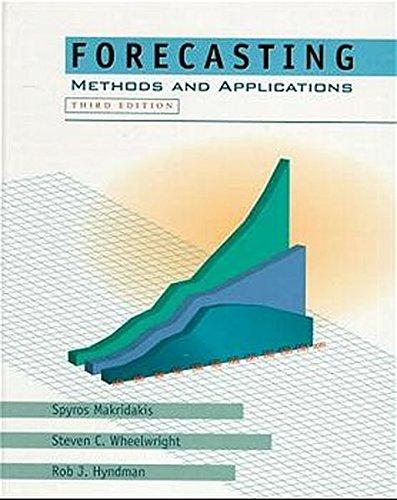Question
1.Assume you wish to borrow $7,000,000 for a new office building and you are evaluating several mortgage choices. The first option is an 8.00% fully
1.Assume you wish to borrow $7,000,000 for a new office building and you are evaluating several mortgage choices. The first option is an 8.00% fully amortizing, monthly payment, fixed rate loan for 10 years with $30,000 in origination fees and no points. The second option is a rate of 7.5% with the payment of .49 discount points and all other terms (including baseline closing costs to which the points are added) identical to the first loan. Finally, the third option is a rate of 6.5% fully amortizing 10-year loan with the payment of 1.3 discount points, a 2% prepayment penalty (computed as a percentage of the initial loan balance), and all other terms identical to the first loan.
a.Compute the annual percentage rate for each loan if it is held for the entire 10 years. Assume there are no extra payments made.
b.Compute the effective rate (not the EAR, just what you will actually pay over the time you hold the loan), assuming that you will pay the loan off after 6 years, and that you never pay more than the required payment prior to that time.
c.Which loan is better if you hold the loan to maturity and why?
d.Which loan is better if you pay off the loan in 6 years and why?
Thanks for your help!
 Real Estate Finance 1. Assume you wish to borrow $7,000,000 for a new office building and you are evaluating several mortgage choices. The first option is an 8.00% fully amortizing, monthly payment, fixed rate loan for 10 years with $30,000 in origination fees and no points. The second option is a rate of 7.5% with the payment of .49 discount points and all other terms (including baseline closing costs to which the points are added) identical to the first loan. Finally, the third option is a rate of 6.5% fully amortizing 10-year loan with the payment of 1.3 discount points, a 2% prepayment penalty (computed as a percentage of the initial loan balance), and all other terms identical to the first loan. a. Compute the annual percentage rate for each loan if it is held for the entire 10 years. Assume there are no extra payments made. b. Compute the effective rate (not the EAR, just what you will actually pay over the time you hold the loan), assuming that you will pay the loan off after 6 years, and that you never pay more than the required payment prior to that time. c. Which loan is better if you hold the loan to maturity and why? d. Which loan is better if you pay off the loan in 6 years and why? 2. Suppose that the liquidity theory of interest rates holds. I observe a one-year interest rate of 4%, and a 2-year rate of 3.5%. What must I expect the one-year rate one year from today to be, and what may this mean for the economy? 3. In class, we talked about inflation, default risk, and maturity (length of loan), as factors, among others, that influence mortgage interest rates. Is this movement a significant factor to borrowers, or merely of theoretical interest? What kind of movement in mortgage rates, how fast may it occur, and what kind of impact are we talking about when we discuss these issues? Try to use numbers and examples from our class discussion and / or handouts to answer this
Real Estate Finance 1. Assume you wish to borrow $7,000,000 for a new office building and you are evaluating several mortgage choices. The first option is an 8.00% fully amortizing, monthly payment, fixed rate loan for 10 years with $30,000 in origination fees and no points. The second option is a rate of 7.5% with the payment of .49 discount points and all other terms (including baseline closing costs to which the points are added) identical to the first loan. Finally, the third option is a rate of 6.5% fully amortizing 10-year loan with the payment of 1.3 discount points, a 2% prepayment penalty (computed as a percentage of the initial loan balance), and all other terms identical to the first loan. a. Compute the annual percentage rate for each loan if it is held for the entire 10 years. Assume there are no extra payments made. b. Compute the effective rate (not the EAR, just what you will actually pay over the time you hold the loan), assuming that you will pay the loan off after 6 years, and that you never pay more than the required payment prior to that time. c. Which loan is better if you hold the loan to maturity and why? d. Which loan is better if you pay off the loan in 6 years and why? 2. Suppose that the liquidity theory of interest rates holds. I observe a one-year interest rate of 4%, and a 2-year rate of 3.5%. What must I expect the one-year rate one year from today to be, and what may this mean for the economy? 3. In class, we talked about inflation, default risk, and maturity (length of loan), as factors, among others, that influence mortgage interest rates. Is this movement a significant factor to borrowers, or merely of theoretical interest? What kind of movement in mortgage rates, how fast may it occur, and what kind of impact are we talking about when we discuss these issues? Try to use numbers and examples from our class discussion and / or handouts to answer this Step by Step Solution
There are 3 Steps involved in it
Step: 1

Get Instant Access to Expert-Tailored Solutions
See step-by-step solutions with expert insights and AI powered tools for academic success
Step: 2

Step: 3

Ace Your Homework with AI
Get the answers you need in no time with our AI-driven, step-by-step assistance
Get Started


